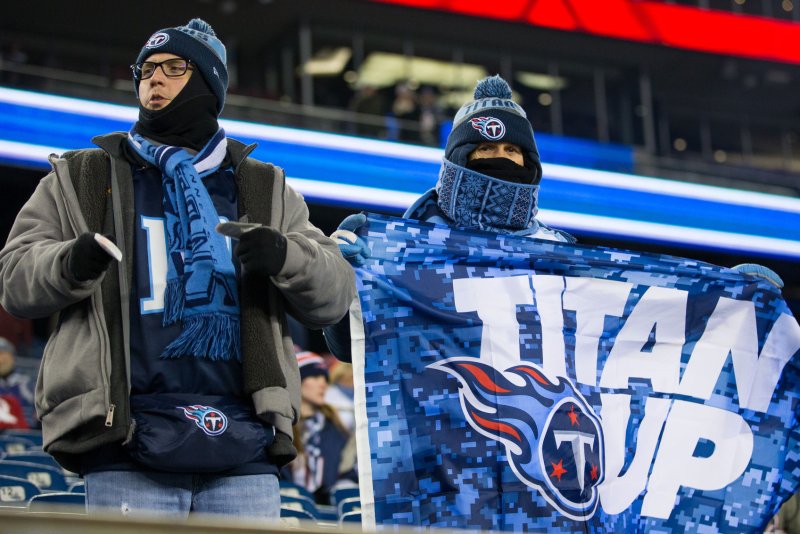Tennessee Titans fans await for the arrival of their team prior to the AFC Divisional round playoff game against the New England Patriots on January 13 at Gillette Stadium in Foxborough, Mass. Photo by Matthew Healey/UPI |
License Photo
It was a bittersweet season for the Tennessee Titans, who in some ways enjoyed their best successes in more than a decade. The Titans not only made the postseason for the first time in nine years, but won their first playoff game in 14 years with a wild-card win in Kansas City. However, speculation persisted that Mike Mularkey's job was in danger, and the Titans parted ways with their head coach after a divisional round loss in New England.
Mularkey's dismissal came about because of a couple of things mostly related to the offense, which regressed from 2016. Mularkey's downfall was because of his reluctance to make changes to his staff and to his offensive philosophy.
Quarterback Marcus Mariota's growth in year three was choked off in large part because of an offense that seemed to stifle him in some ways. Sure, Mariota coming off injuries hurt his development, but in the end, the reason the Titans and general manager Jon Robinson moved in a different direction was because Mariota failed to take the next step on Mularkey's watch, despite a 19-15 record the past two seasons.
Mariota wasn't the only issue, but as the quarterback, he was the focal point of the offensive issues. The running game was inconsistent as DeMarco Murray began to show wear and tear, while the offensive line regressed from 2016. Young receivers Corey Davis and Taywan Taylor also seemed to have a more difficult time than they should have with route-running and getting into the right spots.
WHAT WENT RIGHT: As stated above, the Titans made the playoffs for the first time since 2008 and even won a game for the first time in a long time. For all his struggles with injuries and interceptions (a career-high 15), Mariota showed enough moxie that the Titans believe that in the right hands, he can still develop into a star. The Titans had some other steady players on the offensive side of the ball and a few others that flashed their potential. Tight end Delanie Walker and left tackle Taylor Lewan, both Pro-Bowl selections, were solid, and running back Derrick Henry flashed especially in the playoff win at Kansas City with 156 yards rushing.
Defensively, the Titans were better than a year ago, despite occasional lapses (57 points allowed to Houston, 40 to Pittsburgh). Overall, there are pieces here to work with, led by defensive end Jurrell Casey and All-Pro second-year safety Kevin Byard, who had eight interceptions and two fumble recoveries. Linebacker Wesley Woodyard also enjoyed a resurgence, leading the team in tackles, while pass rushers Derrick Morgan and Brian Orakpo were solid. Punter Brett Kern averaged over 50 yards per punt and made the Pro Bowl for the first time in his 10-year career.
WHAT WENT WRONG: The biggest thing that went wrong for the Titans was the regression of the offense, which was stagnant at times and lacked creativity. There was also the reluctance to use the no-huddle, and things were so unsettled late in the year in a three-game losing streak that receiver Rishard Matthews called the offense "predictable." In the end, despite using a bit more of the no-huddle late in the year, the damage was done and the Titans, apparently believing that head coach Mike Mularkey had taken the Titans as far as he could while clinging to his exotic smashmouth philosophy, parted ways with the organization.















